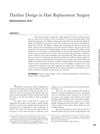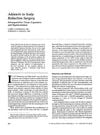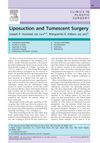 28 citations,
March 1987 in “Journal of The American Academy of Dermatology”
28 citations,
March 1987 in “Journal of The American Academy of Dermatology” Minoxidil may help hair growth after transplant surgery.
[object Object]  25 citations,
November 2008 in “Facial Plastic Surgery”
25 citations,
November 2008 in “Facial Plastic Surgery” Dr. Michael Beehner recommends a personalized, careful approach to hairline design in hair replacement surgery for a natural look.
 25 citations,
March 2008 in “Surgical Neurology”
25 citations,
March 2008 in “Surgical Neurology” New techniques for treating scalp blood vessel malformations are effective and can have good cosmetic results.
 25 citations,
November 2005 in “Facial Plastic Surgery”
25 citations,
November 2005 in “Facial Plastic Surgery” The article concludes that surgeons should tailor facial surgery techniques for Asian males to their unique cultural and anatomical needs.
 24 citations,
August 2013 in “Facial Plastic Surgery Clinics of North America”
24 citations,
August 2013 in “Facial Plastic Surgery Clinics of North America” Hair restoration surgery can have complications; success depends on patient education, careful planning, and proper execution.
 23 citations,
March 2001 in “Clinics in Dermatology”
23 citations,
March 2001 in “Clinics in Dermatology” Hair restoration surgery techniques have evolved, with focus on patient selection and realistic goals, and future advancements may include cloning and gene therapy.
 22 citations,
January 2014 in “International Journal of Trichology”
22 citations,
January 2014 in “International Journal of Trichology” Hair restoration surgery can lead to swelling, infections, scarring, numbness, hiccups, and poor hair growth.
 21 citations,
October 2008 in “Indian Journal of Plastic Surgery”
21 citations,
October 2008 in “Indian Journal of Plastic Surgery” Hair transplantation surgery has improved, giving more natural results, and success depends on a skilled team and proper technique.
 21 citations,
August 1991 in “The Journal of Dermatologic Surgery and Oncology”
21 citations,
August 1991 in “The Journal of Dermatologic Surgery and Oncology” Using tissue expanders and hyaluronidase in scalp reduction surgery allows for more scalp removal and easier surgery.
 20 citations,
January 2006 in “Clinics in Plastic Surgery”
20 citations,
January 2006 in “Clinics in Plastic Surgery” Tumescent liposuction is safe and effective for different cosmetic surgeries if done within recommended limits.
 19 citations,
August 2019 in “Seminars in Plastic Surgery”
19 citations,
August 2019 in “Seminars in Plastic Surgery” Platelet-rich plasma is beneficial in various plastic surgery applications, but more research is needed to standardize its use.
 19 citations,
February 2012 in “International Journal of Urology”
19 citations,
February 2012 in “International Journal of Urology” In Japan, sex reassignment surgery for gender identity disorder faces challenges and needs better medical support and education.
19 citations,
January 2010 in “Hair transplant forum international” PRP can help hair growth, but results vary and need standard methods.
 17 citations,
June 2018 in “Sexual Medicine Reviews”
17 citations,
June 2018 in “Sexual Medicine Reviews” The document concludes that non-operative treatment for gender dysphoria is safe and effective, and hormone therapy does not increase cancer risk.
 15 citations,
January 2023 in “Biomaterials Research”
15 citations,
January 2023 in “Biomaterials Research” 3D bioprinting in plastic surgery could lead to personalized grafts and fewer complications.
 15 citations,
September 2021 in “Archives of Plastic Surgery”
15 citations,
September 2021 in “Archives of Plastic Surgery” The document concludes that facial feminization surgery improves psychological well-being and social acceptance for transgender individuals.
[object Object]  15 citations,
May 2015 in “Photomedicine and Laser Surgery”
15 citations,
May 2015 in “Photomedicine and Laser Surgery” Low-Level Laser Therapy may help with flap survival and burn scar healing, but not with venous ulcers or hair loss, and more research is needed.
 15 citations,
May 2004 in “Facial Plastic Surgery Clinics of North America”
15 citations,
May 2004 in “Facial Plastic Surgery Clinics of North America” New techniques in hair restoration surgery can fix unnatural results from old methods, improving patient self-esteem.
 14 citations,
September 2018 in “JAMA Facial Plastic Surgery”
14 citations,
September 2018 in “JAMA Facial Plastic Surgery” Hair loss greatly lowers perceived health in both genders, and hair transplant surgery notably improves this.
 13 citations,
June 2016 in “Journal of neurological surgery”
13 citations,
June 2016 in “Journal of neurological surgery” Using L-PRF membranes for skull base surgery might help healing, but more research is needed.
 12 citations,
August 2013 in “Facial Plastic Surgery Clinics of North America”
12 citations,
August 2013 in “Facial Plastic Surgery Clinics of North America” Choose hair restoration surgery candidates carefully and plan treatments for a natural look and future hair loss.
 11 citations,
October 2015 in “Journal der Deutschen Dermatologischen Gesellschaft”
11 citations,
October 2015 in “Journal der Deutschen Dermatologischen Gesellschaft” Women who had bariatric surgery risk nutritional deficiencies causing skin issues during pregnancy and breastfeeding.
 11 citations,
August 2003 in “Plastic and Reconstructive Surgery”
11 citations,
August 2003 in “Plastic and Reconstructive Surgery” Hair restoration in children, tailored to their specific needs, can yield good aesthetic results with minimal complications.
 11 citations,
December 1987 in “Aesthetic Plastic Surgery”
11 citations,
December 1987 in “Aesthetic Plastic Surgery” The document concludes that the hCG protocol may help in obesity treatment and could be scientifically justified, but more research is needed.
 10 citations,
May 2019 in “Archives of Plastic Surgery”
10 citations,
May 2019 in “Archives of Plastic Surgery” Follicular unit extraction (FUE) causes less postoperative pain than follicular unit transplantation (FUT), but pain from both methods decreases significantly within two days.
 10 citations,
February 2019 in “The New England Journal of Medicine”
10 citations,
February 2019 in “The New England Journal of Medicine” Removing lymph nodes does not improve survival for advanced ovarian cancer and may cause more complications.
 10 citations,
January 2010 in “Springer eBooks”
10 citations,
January 2010 in “Springer eBooks” Asian hair restoration surgery requires different methods due to the unique characteristics of Asian hair, such as its sparseness and coarseness.
 10 citations,
June 2001 in “International Journal of Cosmetic Surgery and Aesthetic Dermatology”
10 citations,
June 2001 in “International Journal of Cosmetic Surgery and Aesthetic Dermatology” Splitting single-hair grafts seems to improve perceived hair fullness without affecting growth, intact grafts grow slightly better, and the Mantis microscope is clear but slower without reducing damage to grafts.
 10 citations,
December 1997 in “Plastic and Reconstructive Surgery”
10 citations,
December 1997 in “Plastic and Reconstructive Surgery” Hair restoration surgery has improved with better techniques for natural looks and managing patient expectations, but it remains labor-intensive and requires careful consideration of potential complications.
 8 citations,
October 2018 in “Journal of the European Academy of Dermatology and Venereology”
8 citations,
October 2018 in “Journal of the European Academy of Dermatology and Venereology” Mohs micrographic surgery is effective for early-stage non-melanoma skin cancers on the lips, with basal cell carcinoma more common on the upper cutaneous lip and squamous cell carcinoma more common on the lower vermilion lip.





























